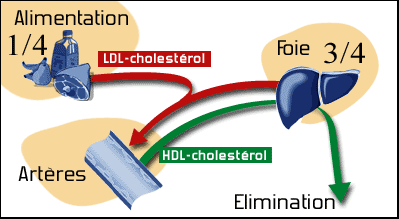The Cholesterol
“More and more of us have high cholesterol levels.
What is cholesterol?
It's a fat that occurs naturally in the body.
It's an essential component of the membranes of all our cells.
It's essential for the production of several hormones and allows the synthesis of D vitamin
Where it is coming from?
2/3 of cholesterol is produced by the liver.
1/3 comes directly from our food.
Why do we say that there is "good" and "bad" cholesterol?
To get to the cells that need it, cholesterol takes the bloodstream using two vehicles:
- HDL lipoproteins which transport cholesterol from the cells to the liver and are then eliminated by the bile, this is the "good" cholesterol.
- LDL lipoproteins, which transport cholesterol from the liver to the cells and, in the event of an excess, release it into the blood, are known as "bad" cholesterol. It tends to deposit on the walls of the arteries and gradually form plaques that grow, harden and block the arteries.

What are the reasons for high cholesterol?
- The most common: A diet too rich in "saturated" fats
- The most unfair: A genetic predisposition
- The most predictable: Certain diseases
- The most reversible: Certain drugs
What are the consequences of high cholesterol?
Cholesterol is a silent killer that clogs the arteries. Insidiously, excess cholesterol is deposited on the artery walls.
Too much cholesterol may not be a problem in everyday life, we do not feel any particular symptoms. Cholesterol hides for years and then suddenly, due to an overload effect, it makes itself known. It can then suddenly cause a serious cardiovascular accident:
- In the brain, it's a Cerebral Vascular Accident (CVA)
- In the heart, it's a myocardial infarction
- In the legs, it's an arteritis.
How do we know if we have excess cholesterol?
- A blood sample must be taken at the medical biology laboratory
- The interpretation of cholesterol levels is not comparable from one individual to another. What is considered "normal" depends on the level of other fatty fractions in the blood, gender, history of cardiovascular disease, smoking etc.
- Always seek the advice of our doctor.
What to do if you have high cholesterol?
Medical follow-up is essential. We should discuss to your doctor, who will prescribe medication if necessary.
We must also take control of our lifestyle:
- Let's adopt a healthy and balanced diet
- Let's increase our level of physical activity
In some cases, adherence to dietary measures may avoid the need for drug treatment.
Another way to reduce excessive blood cholesterol is to use foods enriched with plant sterols (which occur naturally in the diet but in very small amounts).
If we have excess cholesterol, it is necessary to take measures to try to reduce it, But it is better to try to avoid the appearance of this excess cholesterol whenever possible.
To reduce our cholesterol, it is important to take action ourselves every day:
- By adopting a healthy lifestyle and staying active through regular physical activity.
- Through a varied and balanced diet by favouring certain fats, limiting the hidden fats in certain foods and paying attention to cooking methods.
True / False : Do tropical fruits contain more vitamins than other fruits?
True ! This is because the phytonutrient content increases with light. However, it never reaches its maximum if they are picked before ripening and stored at low temperatures.
 Dr Marguerite PANY
Pharmacist and Nutritionist
I have chosen to create this platform to contribute to the improvement of your lifestyle, your health, through the personal choice of a healthy, varied and balanced diet, and the regular practice of physical exercise
Dr Marguerite PANY
Pharmacist and Nutritionist
I have chosen to create this platform to contribute to the improvement of your lifestyle, your health, through the personal choice of a healthy, varied and balanced diet, and the regular practice of physical exercise
